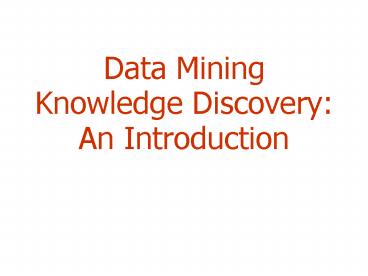Data Mining Knowledge Discovery: An Introduction - PowerPoint PPT Presentation
Title:
Data Mining Knowledge Discovery: An Introduction
Description:
... which produces 1 Gigabit/second of astronomical data over a 25-day observation session ... so much data, it cannot be all stored -- analysis has to be done ' ... – PowerPoint PPT presentation
Number of Views:39
Avg rating:3.0/5.0
Title: Data Mining Knowledge Discovery: An Introduction
1
Data MiningKnowledge Discovery An Introduction
2
Trends leading to Data Flood
- More data is generated
- Bank, telecom, other business transactions ...
- Scientific Data astronomy, biology, etc
- Web, text, and e-commerce
3
Big Data Examples
- Europe's Very Long Baseline Interferometry (VLBI)
has 16 telescopes, each of which produces 1
Gigabit/second of astronomical data over a 25-day
observation session - storage and analysis a big problem
- ATT handles billions of calls per day
- so much data, it cannot be all stored -- analysis
has to be done on the fly, on streaming data
4
5 million terabytes created in 2002
- UC Berkeley 2003 estimate 5 exabytes (5 million
terabytes) of new data was created in 2002. - Twice as much information was created in 2002 as
in 1999 (30 growth rate) - US produces 40 of new stored data worldwide
- See
- www.sims.berkeley.edu/research/projects/how-much-i
nfo-2003/
5
Largest databases in 2003
- Commercial databases
- Winter Corp. 2003 Survey France Telecom has
largest decision-support DB, 30TB ATT 26 TB - Web
- Alexa internet archive 7 years of data, 500 TB
- Google searches 3.3 Billion pages, ? TB
- IBM WebFountain, 160 TB (2003)
- Internet Archive (www.archive.org), 300 TB
6
Data Mining Application Areas
- Science
- astronomy, bioinformatics, drug discovery,
- Business
- advertising, CRM (Customer Relationship
management), investments, manufacturing,
sports/entertainment, telecom, e-Commerce,
targeted marketing, health care, - Web
- search engines, bots,
- Government
- law enforcement, profiling tax cheaters,
anti-terror(?)
7
Assessing Credit Risk Case Study
- Situation Person applies for a loan
- Task Should a bank approve the loan?
- Note People who have the best credit dont need
the loans, and people with worst credit are not
likely to repay. Banks best customers are in
the middle
8
Credit Risk - Results
- Banks develop credit models using variety of
machine learning methods. - Mortgage and credit card proliferation are the
results of being able to successfully predict if
a person is likely to default on a loan - Widely deployed in many countries
9
Successful e-commerce Case Study
- A person buys a book (product) at Amazon.com.
- Task Recommend other books (products) this
person is likely to buy - Amazon does clustering based on books bought
- customers who bought Advances in Knowledge
Discovery and Data Mining, also bought Data
Mining Practical Machine Learning Tools and
Techniques with Java Implementations - Recommendation program is quite successful
10
Genomic Microarrays Case Study
- Given microarray data for a number of samples
(patients), can we - Accurately diagnose the disease?
- Predict outcome for given treatment?
- Recommend best treatment?
11
Example ALL/AML data
- 38 training cases, 34 test, 7,000 genes
- 2 Classes Acute Lymphoblastic Leukemia (ALL) vs
Acute Myeloid Leukemia (AML) - Use train data to build diagnostic model
ALL
AML
Results on test data 33/34 correct, 1 error may
be mislabeled
12
Data Mining, Security and Fraud Detection
- Credit card fraud detection widely done
- Detection of money laundering
- FAIS (US Treasury)
- Securities fraud detection
- NASDAQ KDD system
- Phone fraud detection
- ATT, Bell Atlantic, British Telecom/MCI
- Total Information Awareness very
controversial
13
Problems Suitable for Data-Mining
- require knowledge-based decisions
- have a changing environment
- have sub-optimal current methods
- have accessible, sufficient, and relevant data
- provides high payoff for the right decisions!
- Privacy considerations important if personal data
is involved
14
Knowledge Discovery Definition
- Knowledge Discovery in Data is the
- non-trivial process of identifying
- valid
- novel
- potentially useful
- and ultimately understandable patterns in data.
- from Advances in Knowledge Discovery and Data
Mining, Fayyad, Piatetsky-Shapiro, Smyth, and
Uthurusamy, (Chapter 1), AAAI/MIT Press 1996
15
Related Fields
Machine Learning
Visualization
Data Mining and Knowledge Discovery
Statistics
Databases
16
Statistics, Machine Learning andData Mining
- Statistics
- more theory-based
- more focused on testing hypotheses
- Machine learning
- more heuristic
- focused on improving performance of a learning
agent - also looks at real-time learning and robotics
areas not part of data mining - Data Mining and Knowledge Discovery
- integrates theory and heuristics
- focus on the entire process of knowledge
discovery, including data cleaning, learning, and
integration and visualization of results - Distinctions are fuzzy
witteneibe
17
Knowledge Discovery Processflow, according to
CRISP-DM
see www.crisp-dm.org for more information
18
Major Data Mining Tasks
- Classification predicting an item class
- Clustering finding clusters in data
- Associations e.g. A B C occur frequently
- Visualization to facilitate human discovery
- Summarization describing a group
- Deviation Detection finding changes
- Estimation predicting a continuous value
- Link Analysis finding relationships
19
Data Mining Tasks Classification
Learn a method for predicting the instance class
from pre-labeled (classified) instances
Many approaches Statistics, Decision Trees,
Neural Networks, ...
20
Data Mining Tasks Clustering
Find natural grouping of instances given
un-labeled data
21
Summary
- Technology trends lead to data flood
- data mining is needed to make sense of data
- Data Mining has many applications, successful and
not - Knowledge Discovery Process
- Data Mining Tasks
- classification, clustering,
22
More on Data Mining and Knowledge Discovery
- KDnuggets
- news, software, jobs, courses,
- www.KDnuggets.com
- ACM SIGKDD data mining association
- www.acm.org/sigkdd































